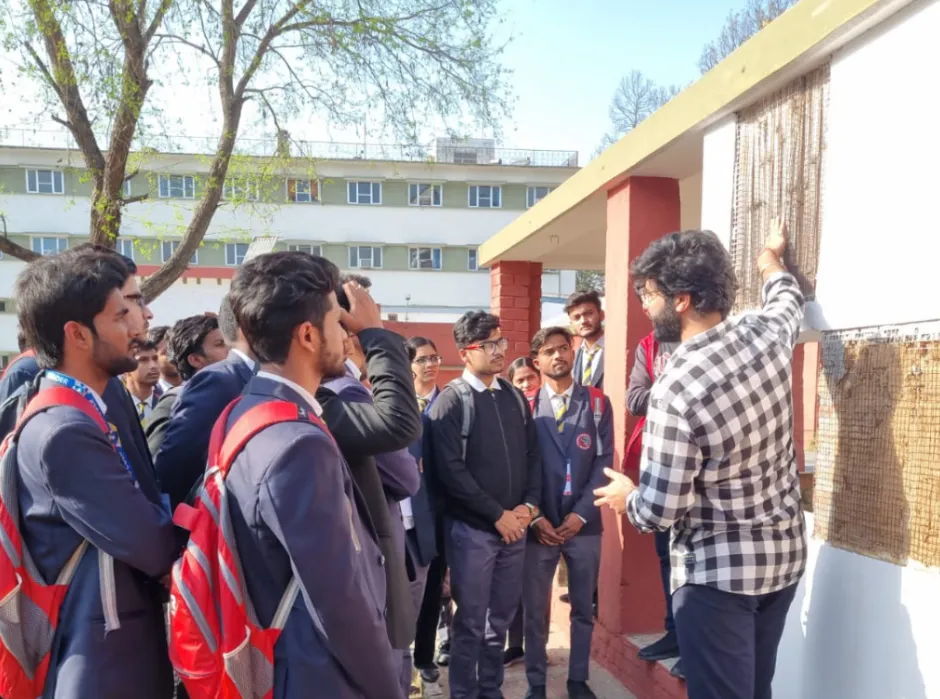
Diploma in Dialysis
Duration
2 Years
Eligibility Criteria
The eligibility criteria for enrolling in the course are an aggregate score of 60% in Physics, Chemistry, Mathematics, or Biology.
Admissions to Diploma in Dialysis Techniques colleges are done on both merit and entrance exam basis.

The Diploma in Dialysis Techniques at the College of Paramedical Sciences, COER University, is a comprehensive 2-year certification program focusing on the purification and filtration of blood to remove excess and waste materials from the kidneys.
This skilled-based course equips students with essential skills in renal dialysis and hemodialysis, preparing them to perform critical procedures effectively. Students will gain hands-on training and theoretical knowledge essential for careers in dialysis technology, ensuring they are proficient in managing and operating dialysis equipment. Join us at COER University to embark on a rewarding journey in healthcare with our specialized Dialysis Techniques program.
Apply NowAdmissions 2026
Find your path to Success
Career Path
Career path you can choose after the course
Dialysis Technician : As a dialysis technician, you'll work closely with patients undergoing dialysis treatment. Your responsibilities may include setting up dialysis machines, monitoring patients during treatment, and ensuring proper sterilization of equipment. Dialysis technicians are in high demand in hospitals, dialysis centers, and clinics across Kerala.
Renal Care Technician : Renal care technicians specialize in providing comprehensive care to patients with kidney-related conditions, including dialysis. In addition to operating dialysis machines, you may assist nephrologists in evaluating patients, performing routine tests, and educating patients about kidney health and dialysis procedures.
Clinical Instructor : With experience and additional training, you can pursue a career as a clinical instructor or educator in dialysis technology programs. In this role, you'll train and mentor aspiring dialysis technicians, oversee practical training sessions, and develop curriculum content to ensure students receive quality education in the field.
Quality Assurance Specialist : Quality assurance specialists play a crucial role in maintaining the standards and safety of dialysis facilities. In this position, you'll conduct regular audits, monitor adherence to protocols and regulations, and implement quality improvement initiatives to enhance the efficiency and effectiveness of dialysis services.

Program Educational Objectives PEOS
-
PEO1
Perform functional assessment of different musculoskeletal as well as neuromuscular impairments. Evaluate Posture, postural problems and reeducation of posture.
-
PEO2
Evaluate and recording of joint range of joint motion. Apply joint mobilization and different manipulative techniques on patients having joint disorders or derangements. Evaluate respiratory issues and application of retraining techniques. Strengthen muscles following a different range of musculoskeletal problems.
-
PEO3
Evaluate and grading of muscle strength. Evaluation of work related problems and application of ergonomics.
-
PEO4
Evaluate and training of muscle coordination. Evaluate and training of balance.
Program Outcomes PO’s
-
PO1
Cooperation with other members of the health team.
-
PO2
Sense of responsibility as a team member.
-
PO3
Interpersonal communication skills.
-
PO4
Empathetic attitude towards the patients.
-
PO5
Positive behavioral approach towards patients as well as persons with disabilities.
-
PO6
Decision making independently with respect to the treatment.
-
PO7
Research attitude to rationalize the treatment options.
-
PO8
Importance of referral system.
Program Specific Outcome PSOs
-
PSO1
Evaluate and assess different musculoskeletal, neuromuscular cardiovascular & respiratory and other conditions.
-
PSO2
Evaluate issues and application of retraining techniques. Strengthen muscles following a different range of musculoskeletal problems.
-
PSO3
Evaluate posture, postural problems and reeducation of posture.
-
PSO4
Evaluate and grading of muscle strength, Apply joint mobilization and different manipulative techniques on patients having joint disorders or derangements.
FAQ
Although, both the courses are good. X-Ray technology, as well as dialysis technology, are emerging medical fields. If we consider the job prospects, average salary range, certification, work pressure, and other factors, then the Diploma in Dialysis Technique is a much better course than the Diploma in X-ray technology. However, the work pressure depends on the specific company/organization.
Mainly, the candidates are trained in 4 key areas including the following
- Maintenance & use of Dialyzer
- Maintenance of Dialyser filter
- Handling of R.O machine
- Operation of Dialysis machine
Yes, of course, the candidate can pursue other opportunities other than the Diploma in charge.
The other career options in the paramedical field include the following.
- Lab Expert
- Medical attendant
- Trainer
- Therapeutic Assistance
The market has a wide range of academic resources for the Diploma in Dialysis Technique. However, we have listed some good resources for your convenience.
- However, we have listed some good resources for your convenience.
- The Dialysis Handbook for Technicians and Nurses by Oscar M Cairoli
- Basics of Dialysis by Ayesha Mugheer
- Manual of Nephrology by Robert W. Schrier
- Essentials of Nephrology by R Kasi Visweswaran
Definitely, the Diploma in Dialysis Technology is a good course in the paramedical field. It is considered the easiest domain in medical procedures. The duration of the course is short. So, the working professionals and even housewives can pursue this course, provided they fulfill the eligibility criteria. There are plenty of places where the students can work including hospitals, nursing homes, clinics, medical labs, medical training centres, dialysis units and many more.









